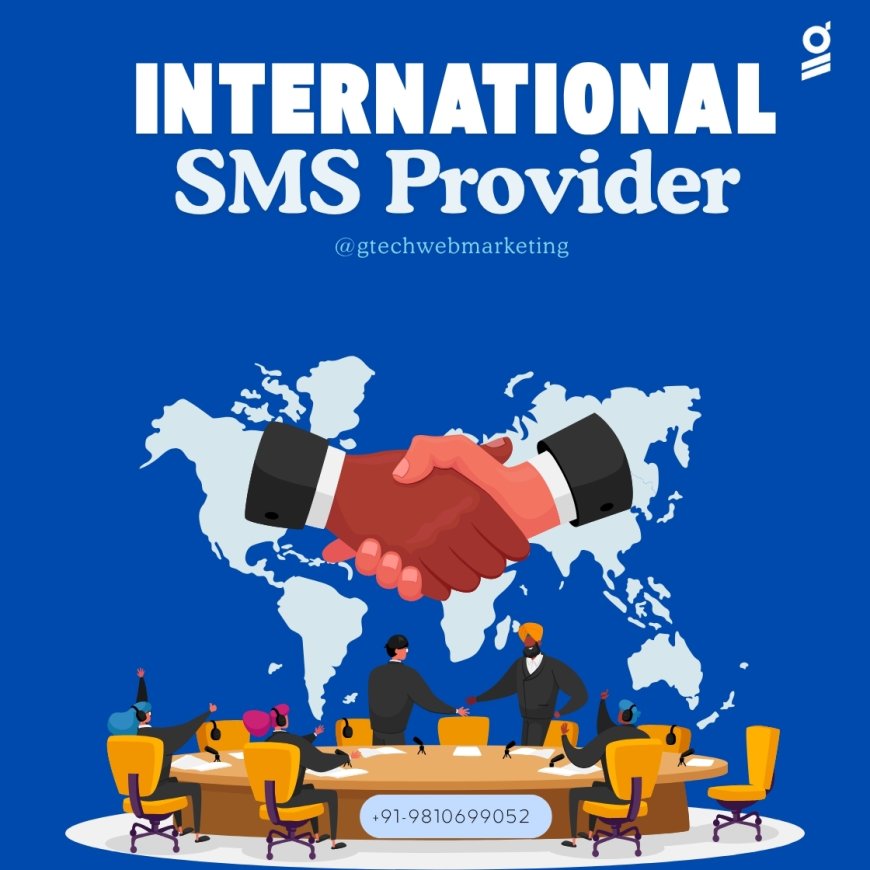International SMS: A Powerful Tool for Global Communication
An international SMS provider is a service company that enables businesses to send text messages across global networks.

In a digitally connected world where communication moves at lightning speed, businesses and individuals continue to rely on one of the oldest yet most effective messaging channelsSMS. While platforms like WhatsApp, Messenger, and email have their place, International SMS remains a reliable and direct method of reaching audiences across borders. This article explores what international SMS is, why it is relevant in todays communication landscape, and how it benefits businesses worldwide.
What is International SMS?
International SMS, also known as global SMS or cross-border texting, refers to the sending of text messages from one country to mobile numbers in another. These messages are transmitted through global telecom networks and can reach recipients even if they dont have internet access. Typically limited to 160 characters per message, SMS is concise, instant, and universally supported on all mobile devices.
Unlike internet-based messaging apps, international SMS does not require the recipient to install any specific software or have a smartphone. As long as the phone is capable of receiving text messages and has a cellular signal, communication is possible.
Why International SMS Still Matters
In the age of 5G, social media, and mobile apps, some might question the relevance of SMS. However, the numbers tell a different story. According to mobile marketing statistics, SMS has a 98% open ratefar higher than emailand most messages are read within 3 minutes of being received. For international outreach, this kind of engagement is invaluable.
Here are a few reasons why international SMS continues to thrive:
-
Ubiquity: SMS works on virtually every mobile phone, regardless of make, model, or operating system.
-
No Internet Required: In regions with limited internet access or unstable data connections, SMS remains a dependable solution.
-
High Engagement: With little to no spam filtering, SMS messages are almost always seen and read.
-
Fast Delivery: International SMS is near-instant, making it ideal for time-sensitive communication.
Key Benefits for Businesses
-
Global Reach:
Businesses can use international SMS to engage customers, employees, or partners anywhere in the world. Whether it's sending promotional offers to customers in Asia or appointment reminders to clients in Europe, the global coverage is seamless.
-
Cost-Effective Marketing:
Compared to traditional forms of international advertising or communication like phone calls or postal mail, SMS is significantly more affordable and delivers faster results.
-
Customer Engagement and Retention:
SMS can be used for personalized promotions, feedback requests, transactional alerts, and loyalty program updates. These regular touchpoints help in building stronger customer relationships.
-
Secure Communication:
Many companies use international SMS for two-factor authentication (2FA), password resets, and security alerts. Its reliability and speed make it ideal for secure interactions.
-
Automation and Integration:
Modern SMS platforms support APIs that integrate with CRMs, e-commerce platforms, and customer service tools. This allows businesses to automate bulk messaging, track delivery rates, and monitor campaign effectiveness in real time.
Use Cases of International SMS
-
Retail and E-commerce: Notify customers about shipping updates, discounts, and flash sales.
-
Healthcare: Send appointment reminders, prescription alerts, and wellness tips to patients.
-
Finance and Banking: Alert customers about transactions, fraud detection, and account changes.
-
Travel and Hospitality: Deliver booking confirmations, itinerary updates, and check-in alerts.
-
Education: Share exam schedules, emergency alerts, and event updates with students and parents.
Challenges and Considerations
While international SMS offers many advantages, there are also challenges that need to be addressed:
-
Regulatory Compliance: Different countries have different rules around SMS marketing and data privacy (e.g., GDPR in Europe, DND lists in India). Its important to comply with local laws to avoid penalties.
-
Message Delivery Issues: Delivery rates can vary depending on the mobile carriers, message format, and local infrastructure.
-
Character Limitations: The 160-character cap can limit the amount of information shared. However, concise messaging often leads to better engagement.
-
Costs per Region: Prices for sending international SMS vary by destination country and carrier, so budgeting must account for these variables.
The Future of International SMS
The future of international SMS looks promising, especially when paired with technologies like Rich Communication Services (RCS) and Artificial Intelligence (AI). RCS enhances messaging with multimedia, read receipts, and chatbot capabilities, while AI can personalize and automate content delivery. Together, these advancements are making SMS smarter and more interactive.
As mobile penetration continues to grow globally, particularly in emerging markets, SMS will remain a vital tool for outreach. With the right strategy and compliance measures, international SMS can help businesses stay connected, expand their presence, and build trust with a global audience.
Conclusion
International SMS may be one of the oldest forms of digital communication, but it is far from outdated. Its simplicity, reliability, and unmatched reach make it an indispensable tool for businesses looking to engage with international audiences. Whether you're a startup aiming to reach overseas customers or a multinational corporation managing global operations, international SMS can help you connect in real timeanytime, anywhere.































